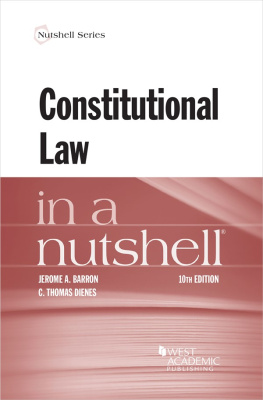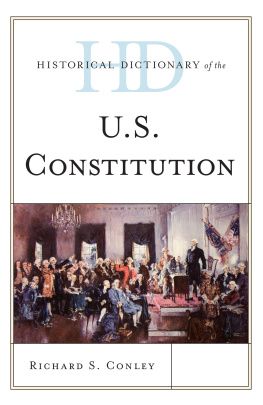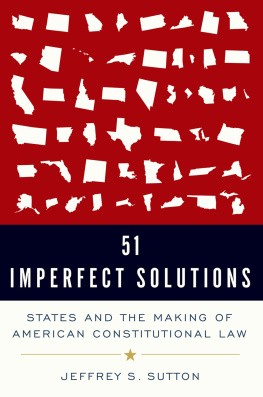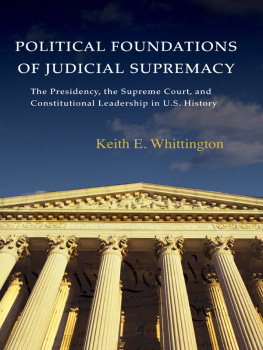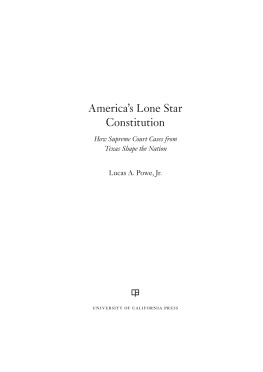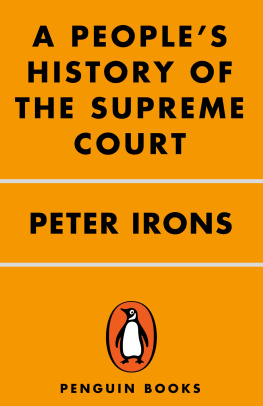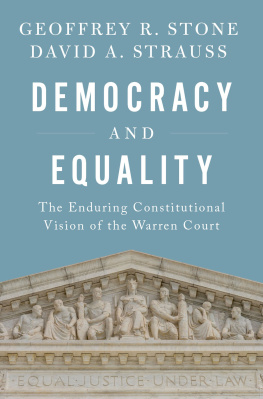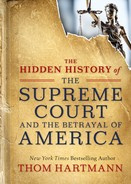Jerome A. Barron - Constitutional Law in a Nutshell
Here you can read online Jerome A. Barron - Constitutional Law in a Nutshell full text of the book (entire story) in english for free. Download pdf and epub, get meaning, cover and reviews about this ebook. year: 2020, publisher: West Academic, genre: Politics. Description of the work, (preface) as well as reviews are available. Best literature library LitArk.com created for fans of good reading and offers a wide selection of genres:
Romance novel
Science fiction
Adventure
Detective
Science
History
Home and family
Prose
Art
Politics
Computer
Non-fiction
Religion
Business
Children
Humor
Choose a favorite category and find really read worthwhile books. Enjoy immersion in the world of imagination, feel the emotions of the characters or learn something new for yourself, make an fascinating discovery.
- Book:Constitutional Law in a Nutshell
- Author:
- Publisher:West Academic
- Genre:
- Year:2020
- Rating:5 / 5
- Favourites:Add to favourites
- Your mark:
Constitutional Law in a Nutshell: summary, description and annotation
We offer to read an annotation, description, summary or preface (depends on what the author of the book "Constitutional Law in a Nutshell" wrote himself). If you haven't found the necessary information about the book — write in the comments, we will try to find it.
This 10th edition of Constitutional Law in a Nutshell summarizes constitutional law from Marbury v. Madison (1803), to the present. The goal has been to discuss the Supreme Courts cases in enough detail to be helpful but not to be verbose in doing so. In this edition we feature thirty new cases.
Some of the highlights include Rucho v. Common Cause (2-10) where the Court held 5-4, per Chief Justice Roberts, that partisan gerrymandering is a non-justiciable issue beyond the competence of the federal judiciary. In Department of Commerce v. New York (2019), although the Court ruled that the Enumeration Clause of the Constitution grants authority to Congress and by extension to the Secretary of Commerce to include a question about citizenship on the 2020 Census questionnaire, the Court could not approve it because the rationale presented to the Court was contrived and was based on a pretext. In Timbs v. Indiana (2019), the Court demonstrated that there still is vitality in the incorporation doctrine and held that the Excessive Fines Clause of the Eighth Amendment is an incorporated protection applicable to the States under the Due Process Clause of the Fourteenth Amendment.
As ever, the free expression area is once again fertile ground for generating Supreme Court case law. In Janus v. American Federation of State, County and Municipal Employees (2018), the Supreme Court, per Justice Alito, 5-4, reversed the 40 year old Abood v. Detroit Board of Education (1977) precedent and held that its ruling requiring non-union members of a public sector union to pay for the collective bargaining of the union is a violation of the First Amendment. In Matal v.Tam (2017), the Court unanimously held that a Lanham Act provision prohibiting the registration of trademarks that disparageor bringinto contempt or disrepute any persons living or dead is a violation of the First Amendment.
In the area of freedom of religion, the Court in Trump v. Hawaii (2018), held, 5-4, per Chief Justice Roberts, that a Proclamation prohibiting or limiting the entry into the United States of nationals from seven countries with Muslim majorities did not violate the Establishment Clause. The Proclamation could reasonably be justified on grounds of national security rather than religious hostility. In American Legion v. American Humanist Association (2019), the Court held, 7-2, per Justice Alito, that the Bladensburg Peace Cross, erected in 1925 on public land in Maryland as a memorial to veterans of World War I did not constitute a violation of the Establishment Clause. Government action which removes monuments that have religious symbolism and that have long been on public land could be seen as aggressively hostile to religion.
Finally, in this edition, as in previous ones, the goal has been to present the essence of the Courts decisions in a concise, readable and understandable way.
Jerome A. Barron: author's other books
Who wrote Constitutional Law in a Nutshell? Find out the surname, the name of the author of the book and a list of all author's works by series.

